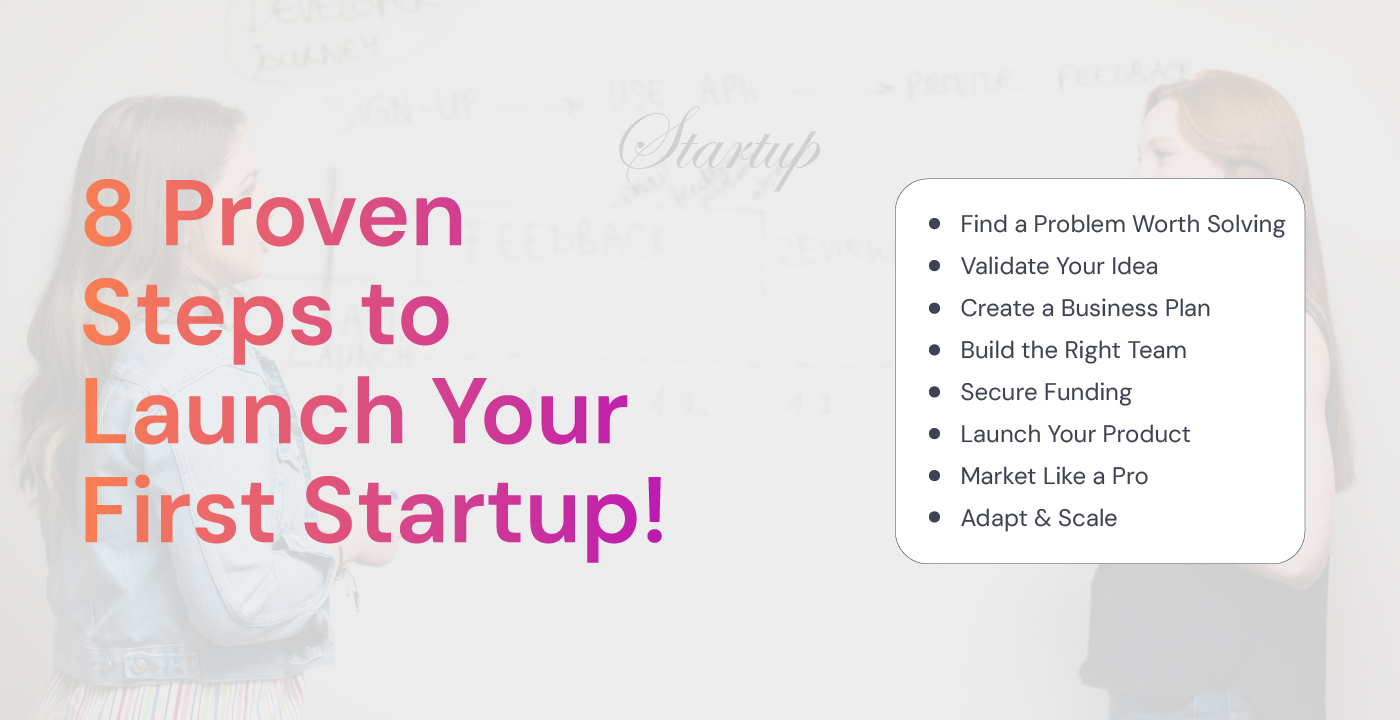Starting a business is exciting, but let’s be honest—it can also feel overwhelming. You may have a great idea, but how do you turn it into a successful startup? The truth is that success is not only about having a smart idea but also about how well you bring it to life.
Many startups don’t fail because of a bad idea or lack of effort. They fail because they miss important steps needed for long-term success. This guide will take you through eight simple steps to help you build a strong and lasting business.
What Checklist Should Startup Founders Follow to Launch a Venture?
Many founders go in headfirst, only to realize they have missed a step or two. But don’t worry, Doerz has got your back! We have prepared a checklist to keep you on track while dealing with your startup.
1- Make Sure Your Idea is Worth It
You might believe your idea is revolutionary but does the market agree? Before going in headfirst, you have to make sure people actually want what you are offering. We recommend this checklist:
- Do market research. Who are your competitors? What are customers looking for?
- Talk to real people, your potential customers. Their opinions matter more than yours.
- Launch a simple version (Minimum Viable Product or MVP) to see if there is real interest.
- Study competitors. Find gaps you can fill instead of reinventing the wheel.
Before building Zappos, founder Nick Swinmurn didn’t buy inventory. He simply took photos of shoes from stores and listed them online. When people started placing orders, he knew the demand was there.
2- Have a Game Plan (A.K.A. A Business Plan)
A business plan could be just like a GPS as it is a document that keeps you from getting lost in too many formalities. Believe us when we say this document is not for investors only. It helps YOU stay focused and make smart decisions.
Your business plans should include these:
- A clear mission and vision. Why does your startup exist?
- Market research; who are you selling to? Who else is selling to them?
- Business model, how will you make money?
- Marketing & sales strategy, how will people find you?
- Financial plan, how much money do you need, and how will you use it?
Stay flexible. Your plan will change as you learn more about your customers and market. Adapt when needed.
3- Find the Right Funding (Without Selling Your Soul)
Your startup needs to grow but that doesn’t mean you need millions upfront. Pick the right funding based on your needs. You can get the best funding options from here:
- Bootstrapping: Use personal savings or reinvest profits.
- Angel Investors: Individuals who invest in startups in exchange for equity.
- Venture Capital (VC): Big investments for high-growth startups.
- Crowdfunding: Platforms like Kickstarter can help you raise funds.
- Government Grants & Loans: Some countries offer support to startups.
Mailchimp started as a bootstrapped company with no outside funding. It gave the founders full control. Today it’s valued at over $12 billion.
4- Build a Solid Team
Your startup is only as strong as the people behind it. A bad team or co-founder conflict can ruin even the best ideas. Find co-founders who balance your skills; not clones of yourself.
Hire for attitude and adaptability, not just experience. Set clear roles and responsibilities early on. Create a culture of trust, transparency and teamwork.
Airbnb’s co-founders, Brian Chesky and Joe Gebbia, didn’t just have a good idea. Chesky was the visionary leader and Gebbia brought the creativity. Their balance made Airbnb a global success.
5- Start Small, Improve Fast (Lean Product Development)
Too many startups fail because they try to build the **perfect** product before launching. Instead, start simple and improve over time.
- Begin with an MVP (a basic version that solves a key problem).
- Gather real customer feedback and make improvements.
- Use agile development; tweak and refine as you go.
- Focus on features that matter, not unnecessary extras.
Twitter started as a podcasting platform called Odeo. When the team noticed users preferred the messaging feature, they pivoted to microblogging… and the rest is history.
6- Get People to Notice You (Marketing & Branding)
A great product means nothing if no one knows about it. You need a solid marketing plan to stand out. We suggest these marketing must-haves for your startup:
- A clear brand story. Why should people care about your startup?
- Understanding your target audience. Where do they spend time online?
- A mix of marketing channels. Social media, content, email, and ads.
- Strategic partnerships and influencer marketing for brand exposure.
7- Be Smart With Your Money (Financial Management)
The #1 reason startups fail is running out of money. It does not matter if you get funding; if you are spending recklessly, you can sink your startup before it even floats properly.
- Track every expense and revenue with accounting tools.
- Keep costs low in the early days as there should be no unnecessary spending!
- Always have emergency cash for surprises.
- Focus on making money early instead of relying on investors forever.
Basecamp (previously 37signals) became profitable early by staying lean and focusing on revenue\\without chasing VC money.
8- Stay Flexible and Listen to Your Customers
The best startups adapt when needed. If something isn’t working, change it instead of holding onto a failing plan. From our experience, we can recommend these agile tips:
- Regularly collect customer feedback. What do they love? What do they hate?
- If something isn’t working, pivot. Don’t be afraid to change direction.
- Keep testing and improving your strategies.
- Stay updated on trends and technology shifts.
Slack wasn’t always a messaging application. It started as a gaming company but pivoted when the team realized its internal chat tool was more useful than the game itself. Today Slack is a leader in workplace communication.
Turning Your Startup Dream into Reality
Not just an idea but starting a startup is more about making smart, calculated decisions at every stage. Validating your idea, securing funding, building a strong team and staying adaptable? You get the recipe to increase your chances of success.
At Doerz Tech, we understand the startup journey because we have been there. Our expertise in software development, business strategy and technology solutions can help you build and scale your dream business.
Let’s make your startup vision a reality. Book a complimentary 30-minute consultation with us today!
People Also Ask
1. What is the biggest mistake startup founders make?
Not validating their idea before investing time and money. Many startups build solutions that people don’t need. Talk to potential users early to ensure real demand.
2. How do I attract investors to my startup?
Have a strong business plan, show market demand, and demonstrate traction with an MVP or early customers. A compelling pitch with clear financial projections can make all the difference.
3. When should I start hiring for my startup?
Hire when absolutely necessary, starting with key roles that drive growth (e.g., product development, sales, or marketing). Pick candidates who align with your startup’s vision and can wear multiple hats.
4. How can I grow my startup without huge marketing budgets?
Leverage content marketing, social media, and partnerships. Focus on organic reach before paid ads. Building a strong brand and engaging community can drive long-term success.
5. How do I know if my startup is ready to scale?
If you have consistent revenue, a strong team, and repeatable processes, you’re in a good position to scale. Ensure your infrastructure can handle increased demand without breaking.








